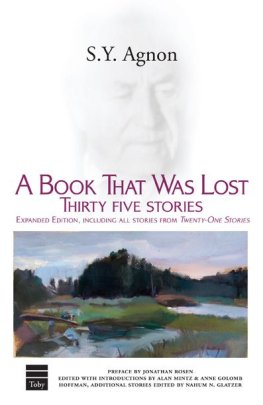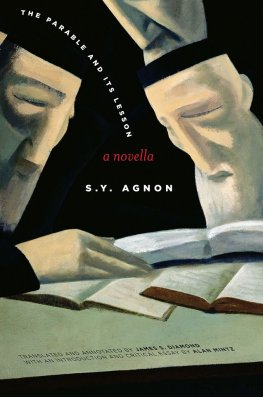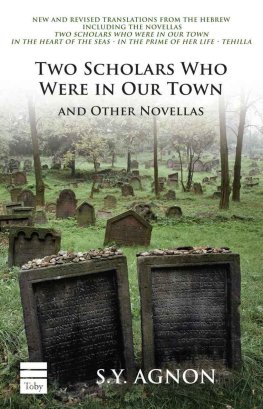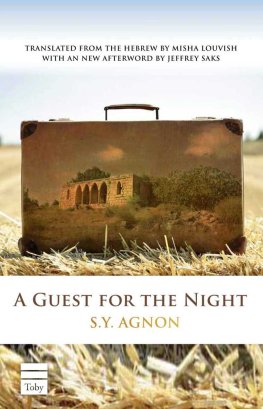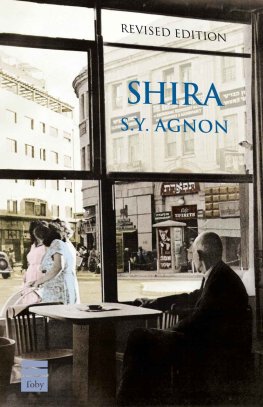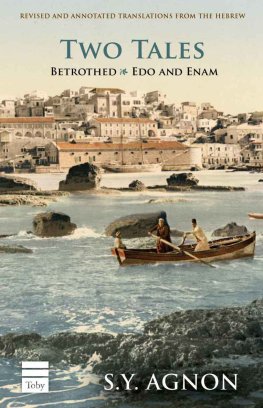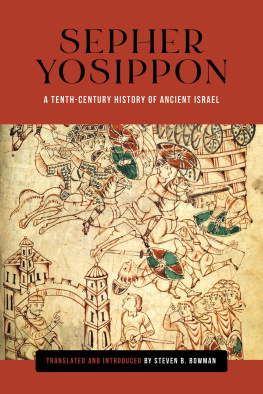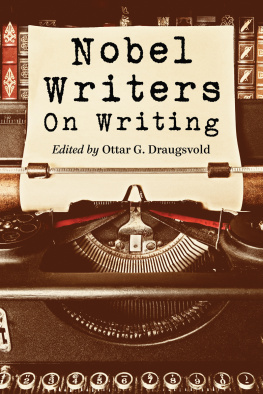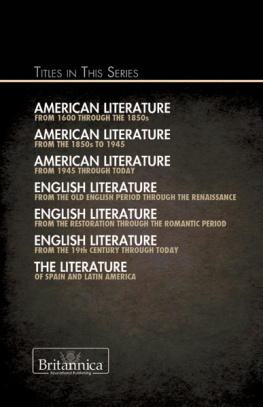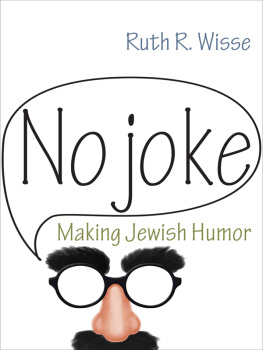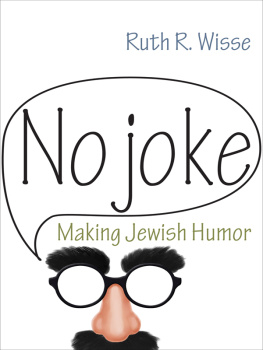S. Y. Agnon
A Book that Was Lost
For my Bar Mitzvah, a friend of my parents, a Jewish writer, gave me a small bundle of books that included a collection of Agnon tales. In those days I did not wonder much about the authors of the books I read. A friend had given me The Hobbit and I didnt know or much care that Tolkien was British, that his dark vision was shaped by a world war, that aspects of his imaginary world drew on Norse mythology. I merely plunged into the story of a small furry creature who follows a wizard and defeats a dragon.
It was the same with Agnon. I once read an interview with I.B. Singer where he talked about reading Dostoyevsky at the age of nine and simply assuming that Dostoyevsky despite the anti-Semitism, or perhaps even because of it was a Yiddish writer. This is how I read Agnon I did not worry about translation, linguistic or cultural barriers. I did not think about Biblical, Mishnaic, Hasidic reverberations, or modern Hebrew interpolations. I just read. And so his stories entered through the same door that Tolkien, and that Dostoyevsky, enter when you read them as teenagers, which is actually the only door literature ought to go through, at least in the beginning.
Agnons stories stirred very strong, disturbing feelings in me. Looking back, I recognize these emotions as tinged with nascent historical and religious and political awakening, though I didnt recognize or have a name for this at the time. It was the dreamlike force of the stories that gripped me. In one, a man was looking for his father in a town where he no longer lived, Pesach was coming, the sun was going down, time and space were bent. I felt deep anxiety and displacement and longing without knowing why.
A Readers Preface
These stories stayed with me for many years, most especially the famous story, Fable of the Goat, included in this collection, about the boy who follows a magical goat that leads him from his shtetl straight to the Land of Israel. The boy in the story follows this goat through a cave and comes out near Tzfat. He is so delighted he decides to stay. He sends the goat back to his father with a note tucked in its ear saying, essentially, Follow the goat. But the father fails to find the note, and in grief and rage, butchers the animal. Only after the goat is dead does the little piece of paper fall out with its messianic message. The shortcut and perhaps the bond between the father and son is lost forever.
This story struck me with tragic force, even though re-reading it I recognize now it is half-ironic, a sort of Aliyah joke, as well as a serious mystical meditation.
But I first read this story without thinking of any of the things I would make myself think about now the binding of Isaac, the way Jacob fooled his father with a goatskin and was in turn fooled with the blood of a goat, or the undertow of Hasidic mysticism and an overtone of Kafkas parable Before the Law, with its infinite waiting. Reading it at thirteen, there was a human ache, a Jewish ache, that stirred in me, ignorant as I was
As I got older, the story of the goat merged with a story I had long known about my own father.
My father went to Israel in 1954 to visit his sister, who had made Aliyah in the 1930s. My father, who had grown up in Vienna visiting Herzls grave, announced that he was just going home to New York to pack his suitcase and would then return to Israel to live. He did not return to Israel for 30 years, when he was in his sixties, and I was in college.
The reasons why my father didnt return are less important at least for the purpose of this preface than the fact that Agnon had already taught me something about going to Israel with his simple fable. Later, when I read Agnons novel Sippur Pashutthough I read it in English as A Simple StoryI recognized how good Agnon was at simple stories that wind up teaching you that in fact there are no simple stories.
In his great novel Only Yesterday Tmol Shilshoma character filled with Zionist dreams makes Aliyah only to have every illusion painfully beaten out of him, much as Don Quixote, his head full of novels of chivalry, sets out on his romantic road only to receive beating after beating. What a shock it was for me to read Agnons Zionist adventure.
His hapless hero is harried by crazy orthodox Jews and cheated by Godless philistine Jews, brutalized by the weather and undone by his own romantic delusions about the land. With Zionism like that, I thought, who needs post-Zionism? Or at least I should say that Agnon made me realize that even after you went to the land, you were still traveling there, still making a sort of journey that never stopped. It was a simultaneously gloomy and oddly uplifting discovery, to know that Israelis were also in a constant process of Aliyah, much as all Jews are constantly choosing to be Jewish even after three thousand years of being chosen.
But by that point I could no longer overlook the fact that Agnon wrote in Hebrew. And I could not ignore the fact that I was cut off from the central element of his writing. The triumph, almost the punch line, of Only Yesterday is that it is written in Hebrew. This Jewish Don Quixote remains in the land of his dream, and, lo and behold, it is no dream, as the Hebrew account of his adventures attests. (Actually, hes destroyed by a mad dog, but thats another story.)
And so now I come to my great shame, of which Agnon is a constant reminder.
There is no magic tunnel to lead me to Agnon; translation may look like one but it leads you to a different place altogether. You have to take the long way around in reading Agnon, but my Hebrew stinks, despite many years of trying to learn it. And even if it didnt stink, it would be inadequate. And so I can only circle Agnon without ever quite arriving. I take some tiny comfort in the observation occasionally made to me that even most Israelis cant understand Agnon anymore. There are, after all, multiple forms of literacy and illiteracy. But it is very small comfort indeed.
A Readers Preface
I remember when the New York Times asked me to review Only Yesterday when it was finally translated, by Barbara Harshav, in 2000. I was delighted, but at the same time I felt, even more than is customary when reviewing a book, a deep sense of fraudulence. I kept thinking about Virginia Woolfs essay On Not Knowing Greek. I can really only speak about not-knowing Agnon.
But there are lots of things I dont really know that I speak about maybe the most important things in life. And Ive come to the conclusion that if one waited for mastery before blundering out into the field, not only would it be impossible to be a writer, or a parent, or a believer in God I dont think one could actually be Jewish. Agnon, easily mistaken as a touchstone of linguistic and religious and cultural authenticity, after all invented himself, and took his very name from one of his own stories.
He was born Shmuel Yosef Czaczkes in 1888, in the town of Buczacz in eastern Galicia, and though he spoke Yiddish and studied traditional Hebrew and Aramaic texts, he was tutored in German as a child and gained early access to European culture. He claimed to have been born on the Ninth of Av, the traditional anniversary of the destruction of both the first and second Temples, weaving brokenness into his very birth and pointing the way for the repair affected by his move to Palestine in 1907. On his fathers side he was linked to Hasidic culture, but his mother was descended from mitnagdim, rationalist doubters of the ecstatic tradition of religious Judaism. Though devoted to Jewish scholarship, he was early on affected by the nascent currents of Zionism that often ran counter to the steadfast life of a traditional Jew. In short, his traditionalism was riven by the contradictions and tensions of modern Jewish life.

